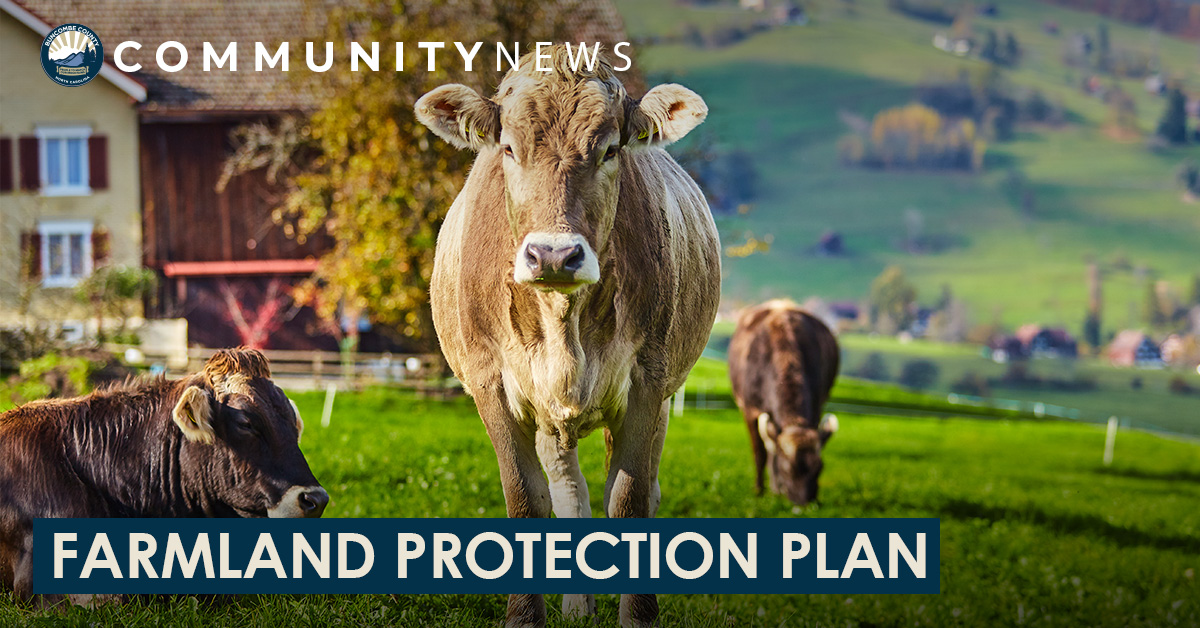This news item expired on Friday, August 5, 2022 so the information below could be outdated or incorrect.

In a move that will continue to preserve one of Buncombe County’s most valuable resources, Commissioners unanimously approved the new Farmland Protection Plan on Aug. 4. Our region’s mountains, pastoral landscapes, and overall natural beauty are hallmarks of Buncombe County and a primary draw for residents, tourists, businesses, and more. Agriculture is a critical component of our aesthetics, and we need to be intentional about preserving farmland and all its associated benefits. Through intentional efforts, Buncombe County has been able to protect farmland in the face of growing development and has more than 300 farms with more than 24,000 acres of land in one of our conservation programs. However, more work needs to be done as the threat of losing agriculture-based land continues to be imminent. To that end, Buncombe County’s new Farmland Protection Plan will help further preserve agricultural areas that improve our quality of life by providing food, clean air and water, viewsheds, and more. This will also help bolster our efforts to meet goals outlined in the County’s 2025 Strategic Plan.
What does the Farmland Protection Plan do?
“The Farmland Protection Plan provides the County with updated analysis of loss of farmland, types of farming in the County, and recommendations for next steps to move the Farmland Preservation Program forward,” explains Soil Conservationist Ariel Zijp. The updated plan is important as the County’s last plan was reliant on data from 2007. The new Farmland Protection Plan offers up-to-date surveys on existing farmland, input from County farmers, threats to agriculture, and other pertinent information that will inform multiple County plans and goals. You can view the Farmland Protection Plan in its entirety here.
Benefits of farmland protection
- Local food for residents
- Viewshed for Asheville’s tourism industry
- Agritourism
- Food resilience
- Clean air, clean water, and healthy ecosystems for wildlife
- Agriculture saves the County money (e.g., cost of Community Services Study)
- Agriculture makes the County money (e.g., easement grant funds, agritourism)
How can I utilize the Farmland Protection Plan?
See the below resources to learn about the numerous ways your agricultural land can be preserved.
Conservation resources supported by the Farmland Protection Plan
Buncombe County’s Soil & Water Conservation District has a variety of methods available that allow property to be preserved and/or continue its agricultural use for generations to come.
- Voluntary Ag District (VAD) Preservation Program: This program that allows farmers to voluntarily enroll their farm property in an agricultural district by signing a conservation agreement stating that they will do no nonfarm development on their property for a period of 10 years. Participating landowners will sign an agreement to sustain, encourage, and promote agriculture and this agreement can be revoked at any time. Some benefits include: Increased protection from nuisance suits and waiver of water and sewer assessments. Find an application here.
- Enhanced Voluntary Ag District (EVAD) Preservation Program: EVAD has all the same benefits and requirements as VAD except that EVAD is a 10 year binding conservation agreement with a conservation deed recorded at register of deeds. This agreement cannot be revoked, and the properties in EVAD are eligible to receive a higher percentage of cost-share funds under the Agriculture Cost Share Program in order to improve their conservation practices on farm. Find an application here.
- Permanent Conservation Easement Agreement: These binding agreements are aimed at keeping land available for farming and forestry in perpetuity while meeting property owners’ needs and production goals. This program permanently protects land to ensure that Buncombe County will have farmland left for future generations. Find an application here.
For more information about farmland preservation, contact Ariel Zijp at (828) 250-4794 or ariel.zijp@buncombecounty.org.